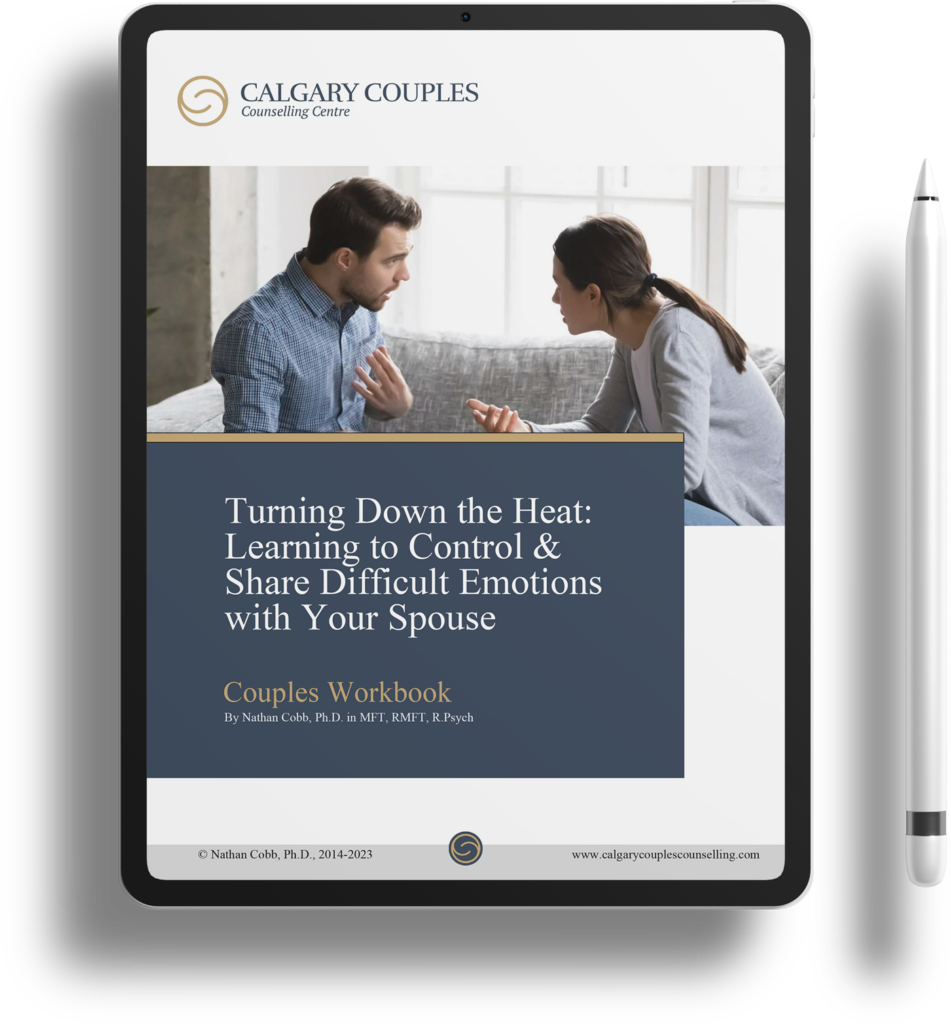Couples counselling helps you and your partner learn the skills required to maintain a healthy and fulfilling relationship. Our therapists are passionate about helping couples improve the quality of their relationships. Each of us specializes, first and foremost, in marriage, couples and premarital counselling, with a few additional areas of expertise particular to each therapist.
At the Calgary Couples Counselling Centre we believe that a connected, trusting, committed couples relationship is the basis for a strong family and provides a secure base for a happy life.

Uncover the potential for a deeper, more fulfilling relationship. Grab your copy now and embark on this transformative journey together!

Our therapists are experienced in counselling individuals with the following types of issues:
Couples counselling can help you achieve the following important benefits in your relationship:
1. Avoid speaking criticisms
When we feel upset or hurt by something our spouse has done or said, we often express it by finding fault with our partner’s motives or character. Try to let your spouse know what you feel (i.e. hurt or sad or alone) in response to his or her actions without being judgmental of those actions. For example, “When I came in tonight and you didn’t say anything I felt hurt and unimportant.”
2. Ask for what you want
Once you can pinpoint your feelings, it often becomes easier to identify what you need, and from there to pinpoint something specific you would like your spouse to do that would help meet that need. For example, “I would really like it if we could greet each other and talk for a few minutes when we see each other at the end of the day.” Asking for what you want in positive terms (i.e. “more quality time together”) rather than complaining about what you don’t want (i.e. “you’re always ignoring me”) can help your partner understand that you are seeking solutions rather than being critical of him or her.
3. Set aside time to talk
Arguments often erupt over small things when there are brewing feelings about unmet needs that have been building up over time. It is common for people to avoid discussing hurt feelings for fear of sparking conflict and fighting. This leads to growing resentments that can fuel the very blow-ups one might be trying to avoid. Setting aside time to talk frankly about things like what is going well and what is challenging for you can help you address hurt feelings before they have a chance to get worse.
A 6-week class for couples, designed to help participants learn skills for effectively managing conflict and difficult emotions and to strengthen communication through mutual vulnerability and openness.

Many couples come to couples counseling because they feel emotionally distant and disconnected from each other. They may feel like they are roommates instead of partners, or like they no longer understand each other. At the Calgary Couples Counselling Centre we believe that strengthening friendship, fondness and admiration, and helping couples create positive interactions is as vital as reducing negativity (i.e. managing conflict) in the relationship.
Our therapists are committed to helping couples build a strong and lasting emotional connection. This includes gaining knowledge of your partner’s feelings, dreams, preferences, styles, and goals. It also includes tuning into your spouse’s emotional needs and being responsive to them with care and attention. Building fondness and admiration for your partner, communicating positive feelings for your spouse, and having fun together are all important parts of deepening your emotional connection.
We understand that building emotional intimacy takes time and effort, but we also know that the rewards are immeasurable. Our therapists will work with you and your partner to develop the skills you need to deepen your emotional connection and create a strong, healthy, and fulfilling relationship. If you and your partner are ready to work on building a deeper emotional connection, we encourage you to reach out to us for support.
If you and your partner are waiting for your first counseling session, there are some things you can do to start fostering a deeper emotional connection and goodwill towards each other right away. Here are a few suggestions:
1. Express gratitude
Take a moment each day to express gratitude to your partner for something they did or said that you appreciate. This can help you both focus on the positive aspects of your relationship and create a sense of goodwill towards each other.
2. Make deposits in the emotional bank account
Consciously try to make small deposits in your partner’s emotional bank account. An emotional bank account is a metaphor for the amount of trust that exists in a relationship. Just like a real bank account, you can make deposits and withdrawals. Deposits are acts of kindness, understanding, thoughtfulness and love that build trust in the relationship. Withdrawals are acts of criticism, anger, and selfishness that erode trust. Making small deposits in your partner’s emotional bank account could be as simple as bringing them their favorite snack, giving them a hug, smiling at them genuinely, or sending a sweet text message to let them know you care.
3. Increase the balance of positivity to negativity
Try to decrease the negativity in your relationship while simultaneously increasing the positive signals that you send to your partner. This could mean actively seeking out positive things to say and do, and being mindful of your tone and body language when communicating with your partner. It could also mean making a conscious effort to reduce negative behaviors, such as criticism, defensiveness, contempt, and stonewalling. For example, instead of criticizing your partner when they forget to take out the trash, try thanking them when they do remember. Or instead of stonewalling when your partner is upset, try listening actively and offering comfort.
Remember, building a strong emotional connection takes time and effort, but it is possible with the right tools and support. We look forward to working with you and your partner to help you build a stronger and more fulfilling relationship.

Couples who are dealing with the aftermath of an affair often struggle with a host of difficult emotions and questions. At the Calgary Couples Counselling Centre Inc., we understand that rebuilding after an affair is a complex process that requires both partners to be willing to engage in honest self-reflection and to gain a deeper understanding of themselves and each other.
Emotional and physical infidelity can be among the most challenging and painful issues that a couple can face and not all relationships heal from the effects of betrayal, nor do all partners necessarily want to reconcile. However, it is important to note that with willingness, desire, renewed commitment, transparency, and hard work, it is possible to heal from infidelity and build a new relationship with your partner.
Our therapists are committed to helping couples navigate the difficult journey of healing and rebuilding after infidelity. We provide a safe and supportive environment where couples can explore their emotions, rebuild trust, and work towards a stronger and more fulfilling relationship.
If you and your partner are struggling with the aftermath of an affair, we encourage you to reach out to us for support. Together, we can help you move forward towards a healthier and happier relationship.
Dealing with the aftermath of infidelity can be a difficult and emotional process, and it’s important to take care of yourself and your partner during this time. Here are a few suggestions for things you can do right now to help cope with the aftermath of infidelity:
1. Create a self-care routine
In the aftermath of finding out about an affair, you will likely experience heightened stress, increased vigilance and hyper-sensitivity to triggers and cues that remind you of the infidelity. Try to make a point of sitting down with a pad of paper and make a list of basic things that you can do to take care of yourself and to ease the burden on your brain and body. These steps can include:
2. Talk honestly
It’s important to express your feelings to your partner in a safe and supportive environment. Set aside sufficient time to talk about your feelings and listen to your partner’s feelings without judgment or defensiveness. We frequently hear from couples that by the time they have their first session with us that they have done more heart-to-heart talking with each other in the last three weeks than they had in the last three years combined. This is normal and is an important part of the healing process. It is important for the hurt spouse to be able to ask questions and have the involved spouse answer as honest and straightforward as possible, without discussing explicit and unnecessary sexual details that can cause further problems down the road. The hurt spouse should take care not to press for such details.
3. Seek support
It is important for both partners to have people they can turn to for support during the healing process. However, the hurt spouse should be cautious about indiscriminately talking to friends or family about what’s happened, as this can also create problems for the couple’s healing down the road. Support should come from an unbiased “friend of the marriage”—perhaps a pastor, a mentor, a therapist, or a close family member trusted by both partners—who will not take sides or feel ill will toward one of the partners.
4. Educate yourself
Educate yourselves with well-researched, informative and accurate information about understanding the impact of infidelity on a relationship, understanding why infidelity happens, and how to heal from it. The resources given above can help with this.
Remember, healing from infidelity is a process, and it’s important to take things one step at a time. These suggestions are just a starting point, and our therapists are here to support you and your partner as you navigate this difficult journey.
We offer a range of digital resources to support you and your partner in your journey towards a stronger and more fulfilling relationship.
We encourage you to download it and read it before your first session. It’s just one of the many resources available in our digital downloads section. Check it out today and see how we can support you on your journey towards a healthier and happier relationship.
Some of the other free downloadable reports and worksheets that we offer include:

At Calgary Couples Counselling Centre, we help you connect with well-trained and experienced counsellors who specialize in couples therapy and who can guide you on the right path toward a happier and more satisfying relationship.
Reaching out for help or support takes courage and we are here to help you take that first step. If you are currently struggling in your relationship, know that it is possible to have love, intimacy and deep connection in your life.
© 2025 Calgary Couples Counselling Centre Inc. | Web by KP Design | COVID Policies | PRIVACY POLICY